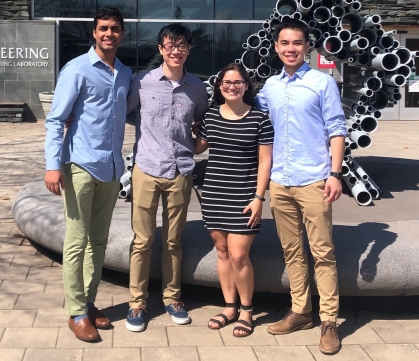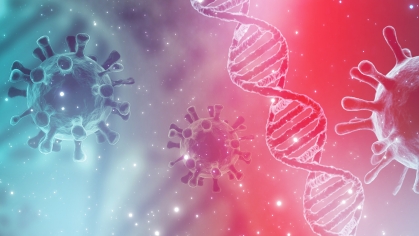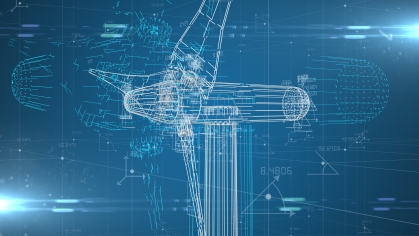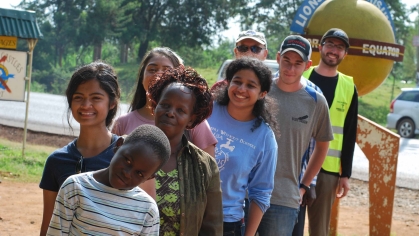SoE Team Wins Rice 360° Global Health Design Competition

Their design of a cancer-diagnosing smartphone app able to classify breast tissue as benign or malignant with 96% accuracy captured first place for Rutgers’ Team Patho-ML in the Rice 360° Institute for Global Health student design competition.
Now in its 11th year, the prestigious international competition, drew a record number of semifinalists from 23 universities in six countries.
Team Patho-ML members Kyle Lee, Kyle Mani, Megan Maniar, and Joseph Nguyen were advised by Mark Pierce, an associate professor in the School of Engineering’s Department of Biomedical Engineering, on the winning project, which was also their senior design project. “The inspiration for the project came from Dr. Pierce and his partnership with the Rutgers Global Health Institute to develop point-of-care tools for use in low resource settings,” recalls Nguyen.
“The team’s success in the competition demonstrates that the biomedical engineering program trains students who are highly motivated to develop and apply technical skills to solve real-world healthcare problems, even during a global pandemic,” Pierce says.
According to Pierce, the seeds of the project were planted with Richard Marlink, director of the Rutgers Global Health Institute, who brought together a team of clinicians and researchers to address cancer care and prevention challenges in low- and middle-income countries such as Botswana, with which Rutgers established the Botswana-Rutgers Partnership for Health in 2018.
“My role’s been to focus on the specific challenge of getting pathology diagnoses to patients more efficiently in regions where there are relatively few pathologists available to examine tissue slides – and where patients can wait for weeks or months for their results before beginning treatment,” explains Pierce.
Simply put, the team used machine learning (ML) to classify microscope images of biopsied breast tissue that are uploaded through an app to a cloud-based algorithm. The students’ app was 96% accurate in classifying benign or malignant tissue and 78% accurate in identifying subtypes of tumors.
While Pierce notes that cases would still need review by a human pathologist for confirmation, the pathologist’s work would become considerably more efficient and targeted.
The students, who began working on their project in September 2020, faced the challenge of working remotely. “Because our project was computationally based, the work itself wasn’t slowed down too much, but not being able to meet in person during senior design class or work on the project together certainly made it difficult at times,” reports Mani, who plans to take a gap year after graduating in May before attending medical school.
“One day, I’d like to work in the intersection between healthcare technology and medicine,” Mani says. “I believe data science and machine learning will revolutionize healthcare in the future. In medical school, I hope to broaden my perspectives on health disparities so that I may contribute towards equal health outcomes for patients across the globe.”
Like Mani, Maniar is planning on going to medical school after taking a gap year. For her, the biggest challenge of the project was narrowing her focus. “My favorite part of the project has been researching cancer care in low-resource settings and developing an understanding of inequities in health care,” she says. “As I have become more familiar with cancer care in Botswana, I’ve begun to see countless ways our project could be improved or further developed.”
The project has also helped her to refine her long-range career goals. “Global health is very important to me,” she says. “I was specifically interested in joining this project because of its direct impact on health disparities and my experience with it has convinced me to contribute to global health equity in my career.”
For Lee, who will be working as a software engineer in the tech industry upon graduating, the project furthered an interest in finding solutions to real-world healthcare problems. “Although I’ll primarily be working in the tech space, I’ll continue to bear an interest in healthcare and contribute to initiatives by leveraging technology in ways that might be helpful,” he says.
Each of the students is confident that there is a bright future for their app. “I believe it can be successfully implemented in the future, as it drastically improves patient outcomes in locations without extensive and expensive medical devices,” says Nguyen, who hopes to continue to work in the healthcare industry after graduating.
“I believe that global health initiatives like this are a great way to improve the quality of life for everyone,” he adds. “Everyone will be affected by diseases either directly or indirectly – which is why improving world healthcare will better the world overall.”
The news release from Rice360 is linked here: https://news.rice.edu/2021/03/29/rutgers-team-patho-ml-wins-rice-360-design-competition/
You can view the team's presentation here: https://www.youtube.com/watch?v=Xp71Re5mcTQ&t=5s


